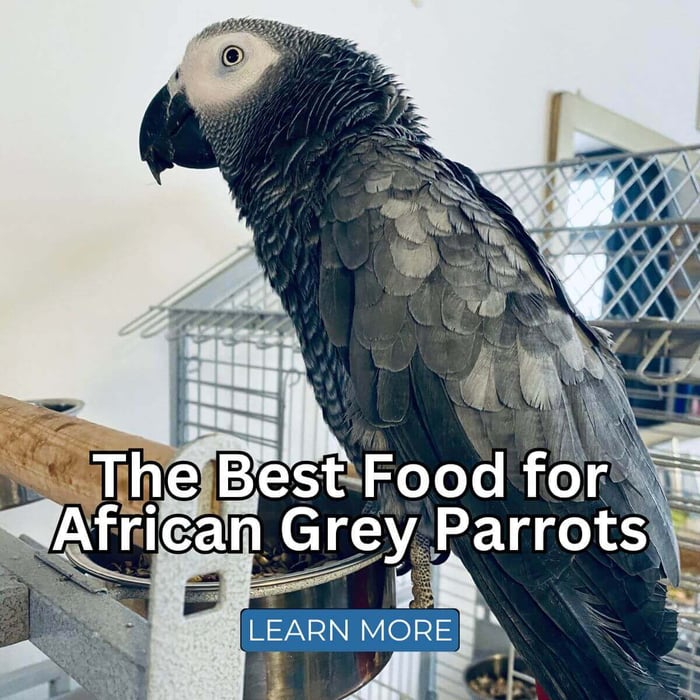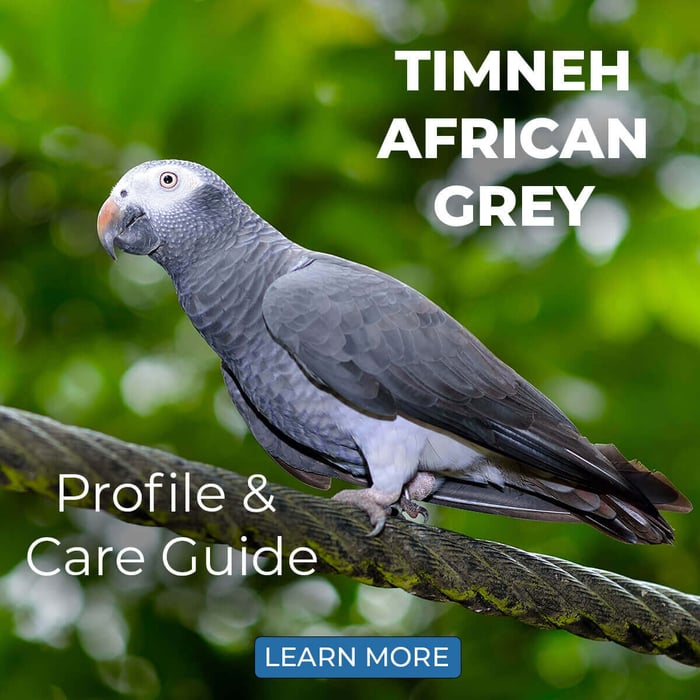African Greys as Pets: Intelligent Companions with Remarkable Personalities
At Parrot Essentials, we mark October 17th as a special day to celebrate African Greys as pets, one of the most intelligent and captivating parrot species in the world. Known for their incredible talking abilities and deep emotional intelligence, African Greys have fascinated bird enthusiasts and researchers for centuries. But what truly makes African Greys exceptional companions, and what should you know if you're considering sharing your home with one?
A Brief History of African Greys as Pets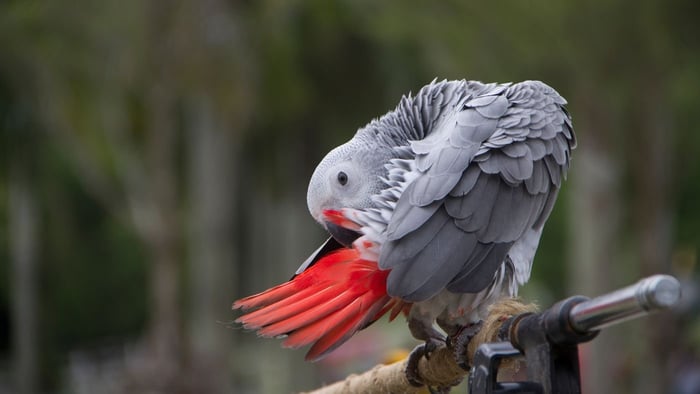
The African Grey Parrot (Psittacus erithacus) has a long history of living alongside humans. Originating from the dense rainforests of Central and West Africa, these parrots have been admired for their intelligence since ancient times. Records show that Greys were kept as companions by the Greeks and Romans, valued not only for their beauty but also for their astonishing ability to mimic human speech.
Today, there are two main recognised subspecies: the Congo African Grey (Psittacus erithacus erithacus) and the Timneh African Grey (Psittacus timneh). The Congo is the larger of the two, with striking silver-grey feathers and a vivid red tail, while the smaller Timneh has darker plumage and a maroon tail. Both species share similar traits, including keen intelligence, curiosity, and strong emotional bonds with their caregivers, but they also have subtle differences in temperament that are worth understanding for anyone considering African Greys as pets.
The Intelligence Behind the Charm
African Greys are often described as the "Einsteins of the parrot world", and for good reason. Dr. Irene Pepperberg's famous research with her parrot Alex demonstrated that Greys are capable of understanding concepts like colour, shape, and quantity, not just mimicking words but grasping their meaning.
This level of intelligence makes keeping African Greys both fascinating and challenging. Their active minds mean they require significant mental stimulation. Without it, they can become bored or stressed, which may lead to behavioural issues such as feather plucking or excessive calling.
Providing your African Grey with a variety of toys, puzzles, and opportunities to forage is essential to their well-being. Rotating enrichment items regularly, such as foraging toys, wooden chew toys, and interactive perches, keeps their minds active and engaged.
You can explore a wide range of suitable enrichment products in the African Grey Supplies Collection at Parrot Essentials.
Personality and Bonding: A Deep Connection
Living with African Greys as pets is not just about providing food and toys, it's about building a relationship based on trust and understanding. These parrots are highly sensitive to their environment and to your emotions. They quickly pick up on moods and can mirror your tone, body language, and even sense of humour.
Many African Grey owners describe their birds as thoughtful, affectionate, and surprisingly empathetic. They enjoy companionship but also value consistency. Sudden changes, such as moving furniture or altering routines, can unsettle them. Patience, calm communication, and gentle social interaction help strengthen the bond and reassure them that they're safe and loved.
Regular interaction through training sessions, talking, or simply spending quiet time together helps nurture their confidence and trust. Harness training, for instance, can be a great way to allow your Grey safe outdoor time while reinforcing your connection.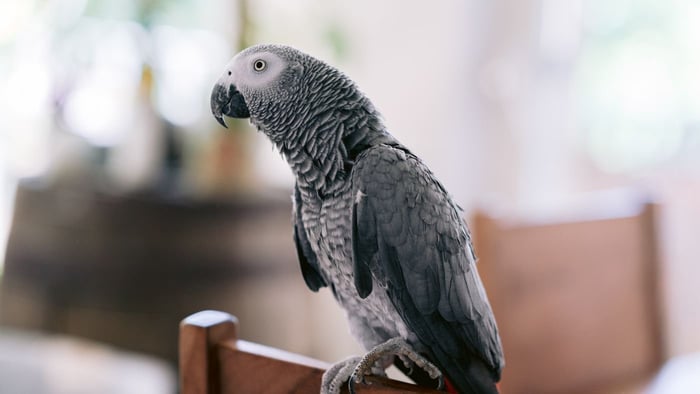
The Different Species: Congo vs. Timneh African Greys
While both subspecies share many traits, understanding their differences can help you choose the right companion for your home.
- Congo African Greys are the more widely recognised type, elegant, expressive, and slightly more sensitive to changes in their surroundings. They are known for their articulate speech and clear mimicry.
- Timneh African Greys, on the other hand, tend to be a little more laid-back and adaptable. They often bond deeply with their caregivers but may be less prone to anxiety when faced with new experiences. Their speech may not be quite as crisp as the Congo's, but they are equally intelligent and engaging companions.
Whichever species you welcome, both require a thoughtful and enriched environment that caters to their need for mental and emotional stimulation. This is especially true for those keeping African Greys as pets in busy households, where routine and attention make a huge difference to their well-being.
Nutrition and Care: Building the Foundation for Health
A balanced diet plays a crucial role in the overall well-being of African Greys. In the wild, they feed on seeds, nuts, fruits, and vegetation, but in captivity, it's important to replicate this variety in a safe and controlled way.
High-quality formulated diets, such as Askio Nature Complete Parrot Food for African Greys, provide a solid nutritional foundation, while fresh fruits, vegetables, and occasional nuts add essential vitamins and minerals. Avoid high-fat seed-only diets, as African Greys are prone to calcium deficiencies and obesity if not fed appropriately.
You can find expertly balanced food options designed specifically for Greys in the African Grey Food Collection.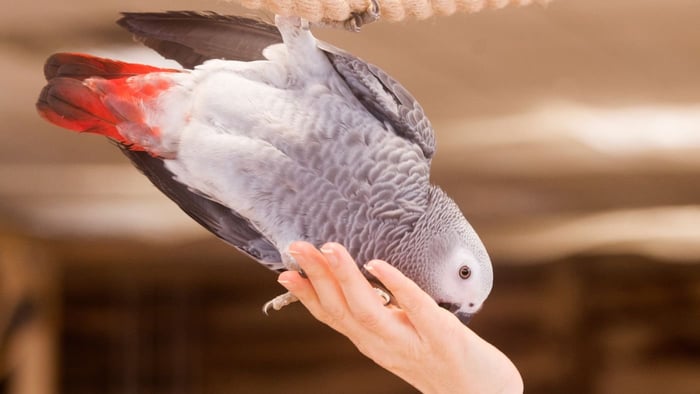
Common Quirks and Challenges
Those who keep African Greys as pets quickly learn that these birds are as complex as they are captivating. Their intelligence and emotional depth mean they form very strong attachments, often to one or two favourite people. This can sometimes lead to possessive behaviour or jealousy if not managed with balanced attention.
They also tend to be birds of habit. A new perch, a different bowl, or even a change in your routine can cause momentary hesitation. However, with patience and gentle reassurance, they adapt, and these moments often reveal just how observant and emotionally aware they truly are.
Noise levels vary between individuals. While African Greys aren't typically as loud as some cockatoos or macaws, they are expressive. Expect lively chatter, whistling, and the occasional uncanny imitation of household sounds like phones, microwaves, or doorbells.
A Lifelong Commitment
Keeping African Greys as pets is a long-term responsibility. They can live for 50 years or more with proper care, making them true lifelong companions. Their longevity means adopting one should be a well-considered decision. They thrive on consistency, routine, and daily interaction, ideal for those who can dedicate time and affection to meet their social and cognitive needs.
When given that care, they repay it with unmatched loyalty and affection. The joy of hearing your Grey greet you by name, mimic your laugh, or invent their own "words" to communicate never fades.
Final Thoughts
Choosing to share your life with an African Grey brings immense rewards and responsibilities. These intelligent, sensitive birds offer companionship unlike any other, blending humour, empathy, and brilliance in one remarkable package.
If you already share your home with one of these extraordinary parrots, take today to celebrate their uniqueness. And if you're thinking of welcoming one, start exploring how to create the perfect environment, from nutrition and enrichment to expert care tips.
FAQs
Are African Greys good pets for beginners?
African Greys are highly intelligent and sensitive birds that need experienced and committed care. They’re better suited for owners who understand parrot behaviour and can provide consistent interaction, enrichment, and training.
How long do African Greys live as pets?
With proper care, nutrition, and regular veterinary check-ups, African Greys can live for 50 years or more. Many have been known to live well into their 60s in loving homes.
Can African Greys really talk?
Yes, African Greys are among the best mimics in the parrot world. They don’t just copy words and sounds but often use them in context, showing remarkable understanding and intelligence.
Do African Greys get attached to one person?
They often form strong bonds with one or two people, but with regular socialisation and gentle interaction, they can become affectionate and trusting with the whole household.
Are African Greys noisy?
They’re not the loudest parrots, but they are vocal. Expect daily chatter, whistles, and amusing sound imitations. Regular enrichment helps keep vocalisations positive and balanced.


